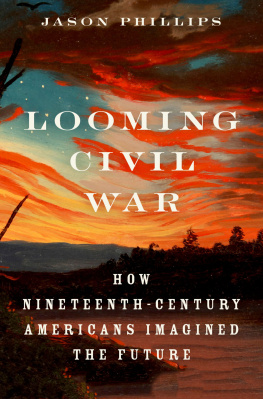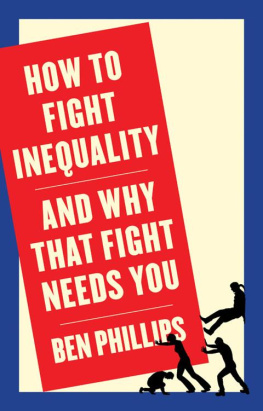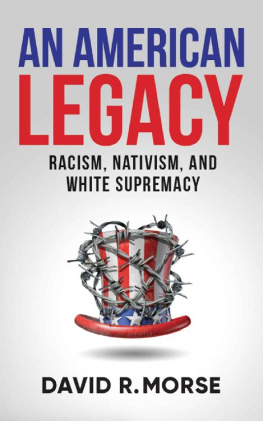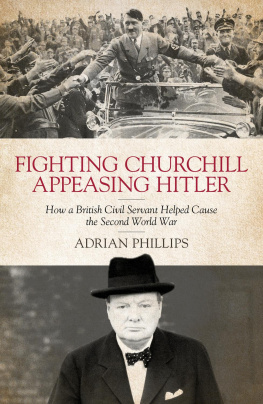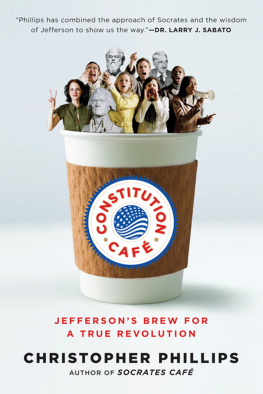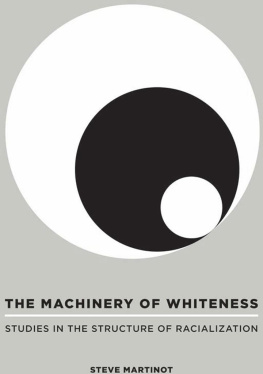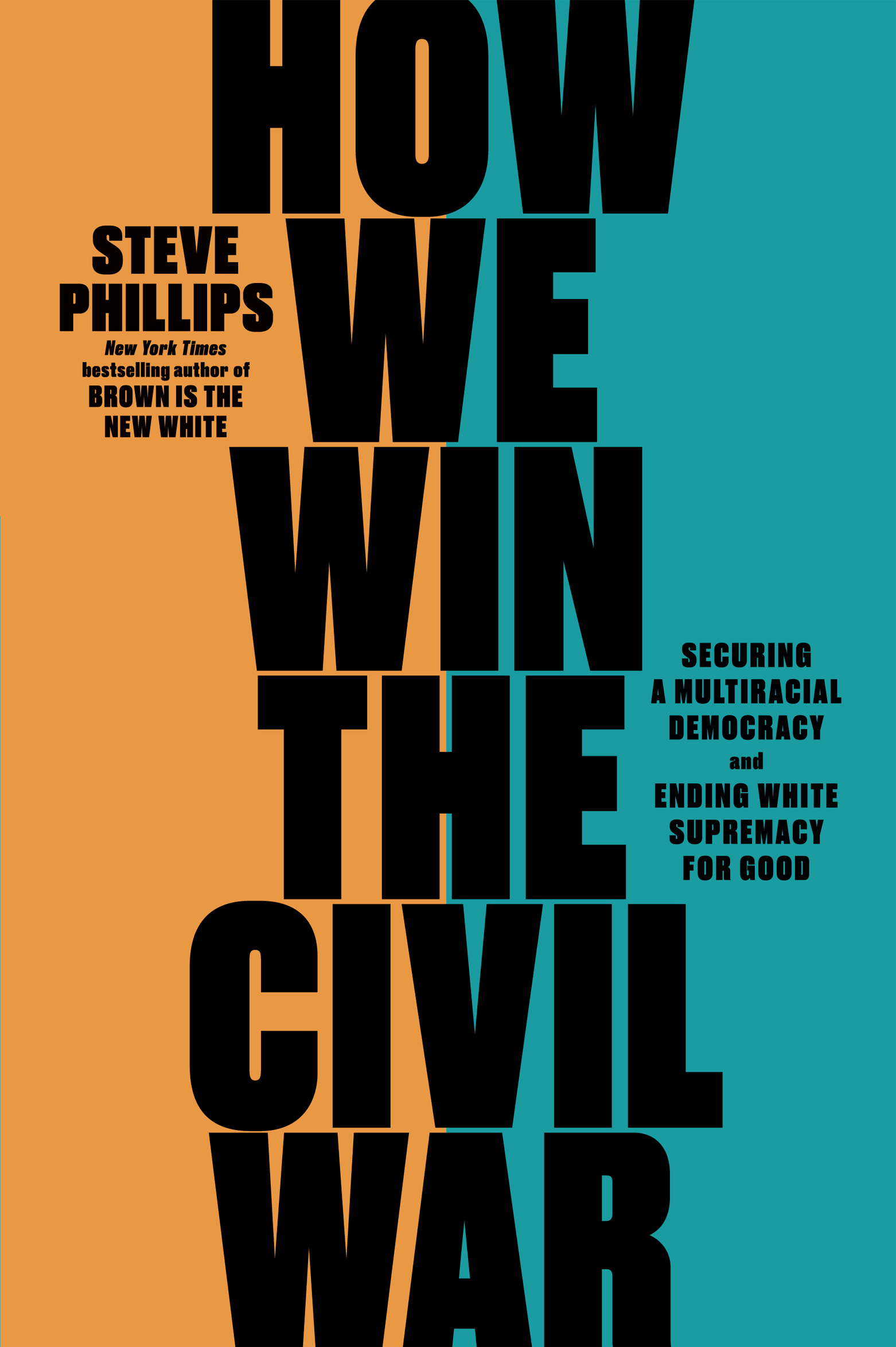Contents
Guide
Pagebreaks of the Print Version
ALSO BY STEVE PHILLIPS
Brown Is the New White:
How the Demographic Revolution Has Created a New American Majority
HOW WE WIN THE CIVIL WAR
Securing a Multiracial Democracy and Ending White Supremacy for Good
Steve Phillips

To Susan: the reality of cancer forces one to a more spiritual place of contemplating life, meaning, and legacy. That reflection has fueled my work on this book to try to make it a lasting legacy for both of us. What I wrote in the dedication of my first book is even truer todaywithout Susan none of this would have been possible, and by this I mean pretty much anything meaningful Ive accomplished in the past thirty years.
To the writers whove gone before: You were my muse in writing this book and I hope Ive adequately honored and carried on the tradition.
To the folks who have done the work, are doing the work, and want to do the work: This is a love letter to all of you. On behalf of a grateful world, I thank you.
CONTENTS
AUTHORS NOTE
A word about names and capitalization in this book: As I wrote in my first book, Brown Is the New White, Names matter to people who have battled discrimination and oppression. Society and my thinking have continued to evolve, and I wanted to say a few things about my choices on these matters so that there is no misunderstanding.
First is the question of referring to individuals by first names or last names. In a world steeped in racism and sexism, disrespect historically has often been conveyed by using someones first name and denying that person the dignity of being referred to by their last name. There is a reason why Sidney Poitiers character in In the Heat of the Night reacts with an indignant response to being called Virgil, a scene that has resonated so deeply with so many for so long. To this day, fifty-five years later, I can still see, hear, and relate to Poitier saying with seething rage, They call me Mr. Tibbs! So, I absolutely get why referring to people by their first names may be construed as a sign of disrespect.
In this book, I do use, upon second reference, the first names of some of the key people featuredStacey Abrams, Tram Nguyen, and othersand I do so for a couple reasons. First, a big part of the problem in the progressive movement is a lack of personal connection to those doing the most important on-the-ground work. Many people dismiss and undervalue leaders who dont look the traditional, strong-straightcis-gendered-white-male-leader part. This results in those leaders being marginalized rather than embraced, centered, and looked to for guidance. I want readers to feel the warmth that I feel for these essential national leaders and develop the connection with them that they deserve. I have gotten to know many of these leaders over the years, and I call them by their first names personally, so hopefully my connection can extend to the reader. With some key leaders, I do use their last names, but thats just because I dont know them as well, and it would feel presumptuous to assume I can be on a first-name basis with them in my book.
Second, there is the issue of how to write out the words describing people in particular groups in this color-conscious country. In this book I use uppercase B for Black people and lowercase w for white people. In Brown Is the New White, I explained that not only was I capitalizing Black, but I was offended by the fact that most publications still spell Black with a lowercase b. The professor Lori Tharps wrote a whole essay in the New York Times titled The Case for Black with a Capital B, and her argument remains completely on point today. She wrote, The New York Times and Associated Press stylebooks continue to insist on black with a lowercase b. Ironically, The Associated Press also decrees that the proper names of nationalities, peoples, races, tribes should be capitalized. What are Black people, then?
Previously, I capitalized white while admitting that, when it comes to the descendants of Europe, I am frankly more ambivalent about capitalizing White. And I cited the writer Tour, who argued, I dont believe that whiteness merits the same treatment [as capitalizing Black]. Most American whites think of themselves as Italian-American or Jewish or otherwise. In addition to endorsing Tours point, I am no longer capitalizing white because white nationalism has become so powerful that I dont want to lend even an ounce of indirect support to the belief that whiteness is a sufficiently distinctive grouping meriting a formal title, characterization, and uppercase letter.
The evolution of our language on these matters is ongoing, uneven, and incomplete, and when quoting others, I have accordingly left original usagethat is, either capitalization or lowercase spellingin place. Ultimately, I am mindful of and have never forgotten the words of my friend Bill King, who was president of the Stanford Black Student Union in the 1980s when the debate was bubbling up about using the phrase African American. During a BSU meeting where people were debating which label to use, an exasperated Bill said, I wish we could just figure out if were Africans, or Blacks, or African Americans so that we can get on with dealing with being oppressed Africans or Blacks or African Americans or whatever. Or, as the comedian Dick Gregory said, the civil rights movement got so hung up on Black that it never got around to Power. Not wanting to replicate that error, let us now turn the page to the question of how to build the power to finally win the Civil War.
INTRODUCTION
A Choice Between Democracy and Whiteness
I decided to reach out to a friend, Taylor Branch, the esteemed historian of the civil rights movement, to hear his thoughts. He was translating this through the lens of Martin Luther King, Jr.s thirteen-year campaign for social justice. So the real question would be, he said finally, if people were given the choice between democracy and whiteness, how many would choose whiteness?
We let that settle in the air, neither of us willing to hazard a guess to that one.
Isabel Wilkerson, Caste: The Origins of Our Discontents
Families frequently take trips to our nations capital. It is common to see parents with their children in Washington, DC, visiting the iconic institutions of the countrys democracy. Shortly after the Christmas holidays in 2020, Lisa, a fifty-seven-year-old white woman who worked as a nurse in Georgia, decided to make the ten-hour drive from Tennessee to DC with her son, Eric, a white thirty-year-old Nashville resident. On Monday, January 4, 2021, they arrived in DC and checked in at the Grand Hyatt Hotel, five blocks from the White House and three blocks from Fords Theater, where Abraham Lincoln was assassinated days after the end of the Civil War.
On Wednesday, mother and son made their way to the National Mall, a 1.8-mile stretch of land that encompasses grassy fields, a reflecting pool that is more than two thousand feet long, and gravel paths for walking or running. At one end of the Mall sits the Lincoln Memorial, the monument honoring the president who won the Civil War and the site where Martin Luther King Jr. delivered his historic 1963 I Have a Dream speech to 250,000 people and a national television audience. At the other end is the United States Capitol, the building where Congress convenes and where presidents are sworn into office. A stroll from one end of the Mall to the other takes a visitor past the White House, the Washington Monument, the National Gallery of Art, and various Smithsonian museums, including the National Museum of African American History and Culture. Perhaps more than any other two-mile stretch of terrain in this country, the National Mall represents and celebrates the essence of democracy in America.


